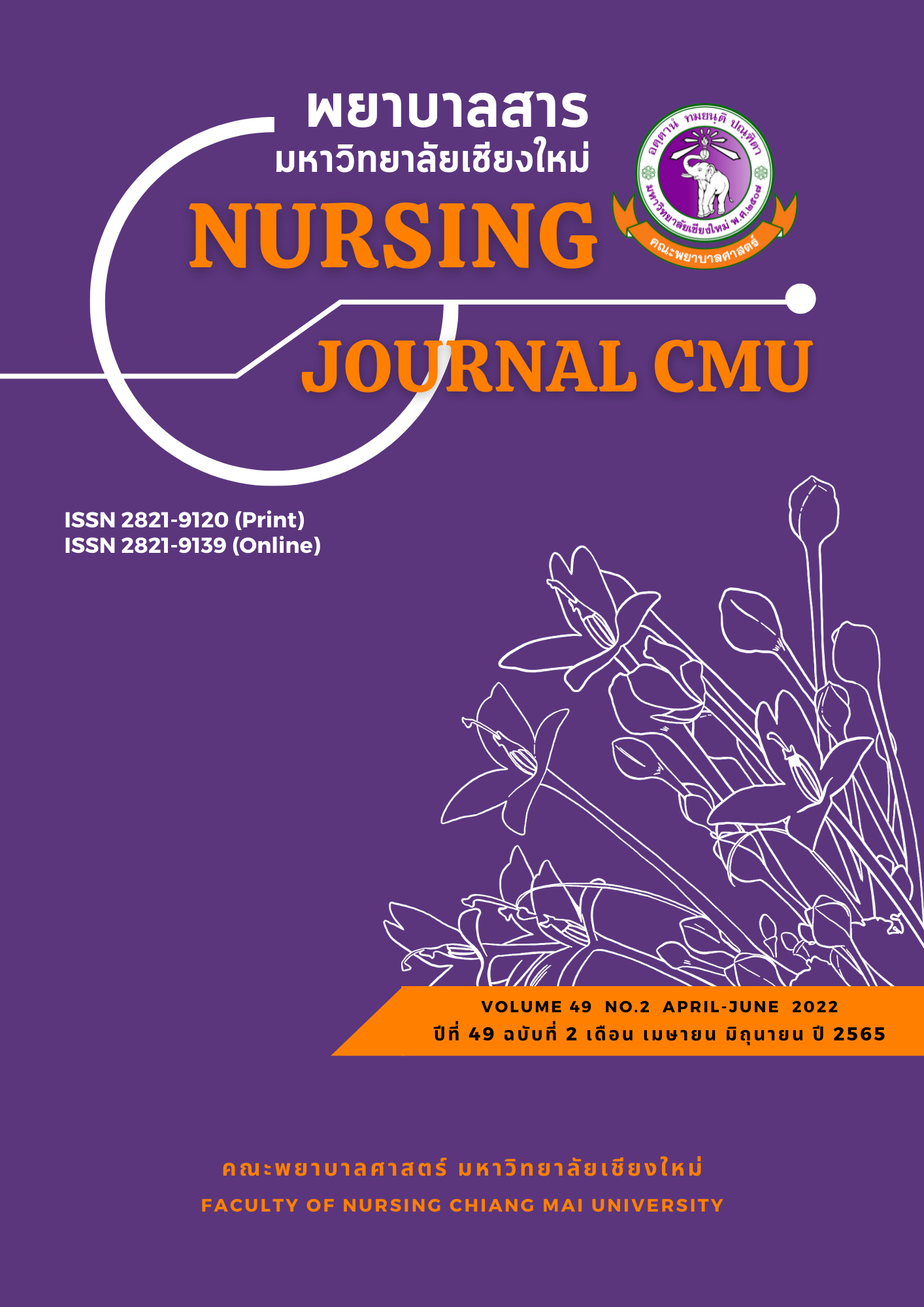Perceived Self-Efficacy and Health-Promoting Behaviors Among Chinese People at Risk for Metabolic Syndrome
Keywords:
Health-promoting behaviors, Metabolic syndrome, Perceived self-efficacyAbstract
A descriptive correlational study was used to explore health-promoting behaviors and perceived self-efficacy, and their relationship, among Chinese people at risk for metabolic syndrome. Purposive sampling was used to select 154 participants from the health management center at the First Affiliated Hospital of Kunming Medical University, the People’s Republic of China. The instruments consisted of a demographic and clinical information form, the Chinese version of the Health-Promoting Lifestyle Profile II (HPLP-II), and the General Self-Efficacy Scale (GSES). The Cronbach’s alpha coefficients for both the Chinese version of the HPLP-II and the GSES were .94. Data were analyzed using descriptive statistics, the Pearson product-moment correlation coefficient, and Spearman’s rank-order correlation test.
The results indicated that overall health-promoting behaviors were at a moderate level (mean = 104.21, SD = 17.50) whereas the mean score for perceived self-efficacy was 26.02 (SD = 5.14). There was a significantly positive relationship between overall health-promoting behaviors and perceived self-efficacy at a moderate level (r = 0.46, p < 0.05). Regarding each dimension, stress management, health responsibility, spiritual growth, and interpersonal relations were significantly positively related with perceived self-efficacy at a moderate level (r = 0.42, 0.32, 0.46, rs = 0.31, p < 0.05, respectively).
The study findings suggest that increasing self-efficacy among Chinese people at risk of developing MS may be beneficial for modifying health-promoting behaviors.
References
Ahn, H. S., Usher, E. L., Butz, A., & Bong, M. (2016). Cultural differences in the understanding of modelling and feedback as sources of self-efficacy information. British Journal of Educational Psychology, 86(1), 112-136.
Burns, N., & Grove, S. K. (2009). The practice of nursing research: Appraisal, synthesis, and generation of evidence (6th ed.). St Louis, Missouri: Saunders Elsevier.
Cao, W. J., Guo, Y., Ping, W. W., & Zheng, J. Z. (2016). Development and psychometric tests of a Chinese version of the HPLP-ii scales. Chinese of Disease Control and Prevention, 20(3), 286-289.
Channel, A. (2014). The relationship of metabolic syndrome and health-promoting lifestyle profiles of Latinos in the Northwest. Hispanic Health Care International, 12(3), 130-137.
Chen, A. Y., & Zhang, L. (2020). Prevalence of health-promoting lifestyle and influencing factors among adults with noncommunicable disease in Guangzhou old urban areas. Chinese General Practice, 23(25), 3241-3246.
Chen, S. H., Chen, S. C., Lai, Y. P., Chen, P. H., Huang, T. Y., Lin, C. C., & Yeh, K. Y. (2019). Correlates between health beliefs and health-promoting lifestyle profiles in the development of metabolic syndrome in Taiwan. Asia Pacific Journal of Public Health, 31(1), 30-38.
Cheng, J., Wang, T., Li, F., Xiao, Y., Bi, J., Chen, J., . . . Luo, R. (2015). Self-rated health status and subjective health complaints associated with health-promoting lifestyles among urban Chinese women: A cross-sectional study. PLOS One, 10(2), e0117940.
Cheung, C. K., & Kam, P. K. (2012). Resiliency in older Hong Kong Chinese: Using the grounded theory approach to reveal social and spiritual conditions. Journal of Aging Studies, 26(3), 355-367.
Chinese Diabetes Society. (2004). Recommendations of the Chinese diabetes society on metabolic syndrome. Chinese Journal of Diabetes, 12(3), 156-161.
Choo, J., & Kang, H. (2015). Predictors of initial weight loss among women with abdominal obesity: A path model using self-efficacy and health-promoting behaviour. Journal of Advanced Nursing, 71(5), 1087-1097.
Grundy, S. M. (2016). Metabolic syndrome update. Trends in Cardiovascular Medicine, 26(4), 364-373.
Joseph-Shehu, E. M., Ncama, B. P., & Irinoye, O. O. (2019). Health-promoting lifestyle behaviour: A determinant for noncommunicable diseases risk factors among employees in a Nigerian University. Global Journal of Health Science, 11(12), 1-15.
Leung, Y. S., Lee, J. J. W., Lai, M. M. P., Kwok, C. K. M., & Chong, K. C. (2020). Association between obesity, common chronic diseases and health promoting lifestyle profiles in Hong Kong adults: A cross-sectional study. BMC Public Health, 20(1), 1-9.
Li, R., Li, W., Lun, Z., Zhang, H., Sun, Z., Kanu, J. S., . . . Liu, Y. (2016). Prevalence of metabolic syndrome in Mainland China: A meta-analysis of published studies. BMC Public Health, 16(1), 1-10.
Lizama, A. J. C., Villanueva, B. J., Martínez, D. P., Leiva, F. C., & Mella, E. R. (2021). Obesity: Perceived self-efficacy, emotional regulation and stress. Psicologia: Teoria e Pesquisa, 36(1), e36411.
Luan, W., Zhu, Zh., Zhu, D. P., Ge, W. J., Zhu, Q. M., Jiang, Y. Q, . . . Jiang, A. L. (2020). Relationship of health promotion lifestyle with social support and self-efficacy of the elderly in urban-rural communities. Journal of Shanghai Jiao Tong University, 40(1), 107-111.
Mohamad, N., Mulud, Z. A., Ibrahim, M., & Damanhuri, N. F. (2019). The relationship between self-efficacy and health promoting behaviour among older adults with chronic illness. Environment-Behaviour Proceedings Journal, 4(11), 73-78.
Pender, N. J. (1996). Health promotion in nursing practice (3rd ed.). Stanford, CT: Appleton and Lange.
Pender, N. J., Parsons, M. A., & Murdaugh, C. L. (2011). Health promotion in nursing practice (6th ed.). Boston: Pearson.
Schwarzer, R., & Jerusalem, M. (1995). Generalized self-efficacy scale. Measures in health psychology: A user’s portfolio. Causal and Control Beliefs, 1(1), 35-37.
Shi, M. W., & Zhao, S. Y. (2014). Confucianism and stress management: Stress study from the Chinese perspective. Journal of Nanjing Normal University (Social Science Edition), 3(2), 117-122.
Walker, S. N., & Hill-Polerecky, D. M. (1996). Psychometric evaluation of the health-promoting lifestyle profile II. Retrieved from https://deepblue.lib.umich.edu/bitstream/handle/2027.42/85349/HPLP_II-Dimensions.pdf?sequen-ce=2
Xu, X. Y., Leung, A. Y. M., & Chau, P. H. (2018). Health literacy, self-efficacy, and associated factors among patients with diabetes. HLRP: Health Literacy Research and Practice, 2(2), e67-e77.
Zhang, J. X., & Schwarzer, R. (1995). Measuring optimistic self-beliefs: A Chinese adaptation of the general self-efficacy scale. Psychologia: An International Journal of Psychology in the Orient, 38(3), 174-181.
Downloads
Published
How to Cite
Issue
Section
License
Copyright (c) 2022 Nursing Journal

This work is licensed under a Creative Commons Attribution-NonCommercial-NoDerivatives 4.0 International License.
บทความที่ได้รับการตีพิมพ์เป็นลิขสิทธิ์ของวารสารพยาบาลสาร
ข้อความที่ปรากฏในบทความแต่ละเรื่องในวารสารวิชาการเล่มนี้เป็นความคิดเห็นส่วนตัวของผู้เขียนแต่ละท่านไม่เกี่ยวข้องกับมหาวิทยาลัยเชียงใหม่ และคณาจารย์ท่านอื่นๆในมหาวิทยาลัยฯ แต่อย่างใด ความรับผิดชอบองค์ประกอบทั้งหมดของบทความแต่ละเรื่องเป็นของผู้เขียนแต่ละท่าน หากมีความผิดพลาดใด ๆ ผู้เขียนแต่ละท่านจะรับผิดชอบบทความของตนเองแต่ผู้เดียว






